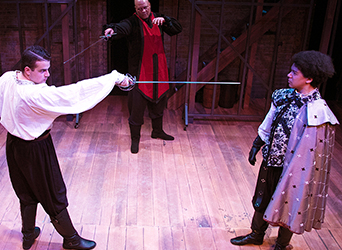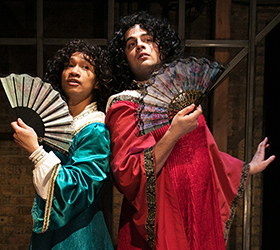From the Chicago Tribune
‘Her Majesty’s Will’ is a heady, silly romp that works
June 7, 2017
By Kerry Reid
3.5 out of 4 stars
Nature may abhor a vacuum, but holes in the timeline offer catnip to authors of historical fiction. Where facts cannot be found, imagination runs wild.
In “Her Majesty’s Will,” David Blixt’s imagination takes us on a romp through the so-called “Lost Years” of William Shakespeare — that period from roughly 1578 to 1592 in which (other than the record of his marriage to Anne Hathaway and the birth of their children), practically nothing is known of his life. In his 2012 novel, Blixt (who is also a Chicago-based actor and fight director) tosses Will into the world of high-stakes espionage and London lowlifes. For good measure, he also tosses in Christopher Marlowe.
It’s a nearly perfect choice for Lifeline Theatre, whose best productions often include wink-and-a-nod approaches to classic storytelling tropes. In Robert Kauzlaric’s adaptation, directed by Chris Hainsworth, Blixt’s wild ride shows young Will Falstaff (as he’s been calling himself) finding his voice as a man and artist, even as he assumes many different guises in order to survive.
Shakespearean in-jokes abound — someone actually does “exit, pursued by a bear,” as in the famous stage direction from “A Winter’s Tale.” Amid the political intrigue, the story also tosses in same-sex attraction, feminist moxie and plenty of inventive stage fights. (Blixt created the latter, and if you’ve ever wanted to see tankards vs. swords in a pub fight, this is your show.)
And somehow, it all comes together in a mix that manages to be heady and silly in equal measure. There are moments that strain toward profundity, and it takes a little while in the first act for the narrative and the production to find the balance in the tone. But Kauzlaric’s well-honed adaptation and Hainsworth’s smart and supple direction, along with a high-spirited cast, move the entire affair along with deft precision, almost never letting us get ahead of the twists in the story.
That story begins with Will in Lancashire, working as a put-upon schoolmaster. A chance encounter with a serving woman being manhandled by a pair of rogues sets him off on his road trip to London. The serving woman turns out to be “Kit” Marlowe, who has uncovered secret messages from Mary Queen of Scots to Catholic rebels bent on overthrowing Protestant Elizabeth I.
With the rebels in pursuit, the two men make their way to London, where an unlikely potpourri of Marlowe’s fellow carousing men of letters, theater folks and courtiers become ensnared in the plot. There are also a couple of plays-within-the-play that let us see where Shakespeare lifted and refined some of his own stories and devices.
In the tradition of all great buddy escapades, amid the plot twists lies a fine bromance (well, a bit more than that, actually). Javier Ferreira’s Will, entranced by the streets and stages of London, moves from an earnest schoolteacher haunted by memories of his loutish father to a man who trusts his own will and heart. Bryan Bosque’s charming but maddening Marlowe shows flashes of warmhearted loyalty amid his preening. (“I always win,” he declares at one point. “That’s what makes being me so satisfying.”)
The rest of the cast, who all play multiple roles, deliver fluid and cunning turns running the gamut of London society, from dastardly nobles to put-upon showfolk. Heather Chrisler especially holds her own as the only woman in the cast, playing the chorus/narrator, a pair of very different pub maids and a lady-in-waiting to the queen, who doesn’t rely upon her corset to stand proud. (Aly Renee Amidei’s costumes provide period detail and eye candy galore.)
Admittedly, the show probably offers a few more treats for people who know their Shakespeare. (An Earl of Oxford joke might sail over the heads of those unacquainted with the “authorship” debate.) But even those unaffected by Bardolatry will find much to enjoy in “Her Majesty’s Will.” By the end, Blixt’s tale provides an uplifting homage to how common people find uncommon reserves of poetry, courage, wit and honor in times of unrest.
From Chicago Theater Beat
World premiere is pure summer escapism
June 21, 2017
By Lauren Whalen
3.5 out of 4 stars
For all we know of William Shakespeare, several years of the iconic playwright’s early life remain a mystery. In his novel Her Majesty’s Will, Chicago author, actor and fight choreographer David Blixt imagines Shakespeare’s “lost years” as a swashbuckling adventure full of intrigue, mystery – and a friendship with fellow future playwright Christopher Marlowe. Lifeline Theatre’s adaptation – for which Blixt provides the violence design – is an Elizabethan spy caper and buddy flick. In their quest to protect the Queen, Shakespeare and Marlowe trade barbs, fight evil and, quite possibly, fall in love. Featuring two dynamic leads, exciting fight scenes and fantastic direction, Her Majesty’s Will is pure literary escapism, a smooth summer treat in period garb.
Javier Ferreira and Bryan Bosque star as William Shakespeare and Christopher Marlowe in Her Majesty’s Will, Lifeline Young Will (Javier Ferreira) is marooned in Lancashire, a wanted man in London for mysterious reasons. Living under an assumed name, he’s teaching reluctant students, bored out of his mind. Will’s always been intrigued by theater, but doesn’t have the formal education to even consider a career on the boards. Enter Marlowe (Bryan Bosque), who’s daring and charismatic where Will is straitlaced and reserved. When Marlowe offers Will a diversion in the form of espionage – God save the Queen – Will jumps at the chance, proving himself able with a sword and drawn in by Marlowe’s charms. But is Marlowe all he seems?
Beautifully adapted by Jeff Award-winner Robert Kauzlaric, Blixt’s plotting and characterization are inventive and inspired. Though the Shakespearean references get a little precious at times, the idea of Shakespeare and Marlowe as good friends and partners in crime is delicious. Their evasion of the dastardly Sir Thomas Lucy (Dan Cobbler) and bumbling through onstage roles, among other escapades, are funny and charming. Though Will is the protagonist, Marlowe is also relatable, displaying vulnerability and passion under his glib exterior. The two are surrounded by a quirky assembly of characters, from the boorish Cutting Ball (a hilarious, scene-stealing Mike Ooi) to elegant, witty lady-in-waiting Helena (Heather Chrisler, who also provides narration in a gorgeous speaking voice).
Though the script could be trimmed, Lifeline ensemble member Chris Hainsworth keeps the action running at a steady, fun pace, and Blixt’s fight choreography is as graceful as it is cutting. Scenic designer Eleanor Kahn keeps things simple with multiple levels and building block-like structures that move easily, and Aly Renee Amidei’s costumes are both lovely and era-appropriate.
Nonetheless, this is a show that belongs to young Shakespeare and Marlowe: the scrappers they were, and the controversial geniuses they’ll become. Casting director Lavina Jadhwani chose wisely and well with Ferreira and Bosque: Ferreira’s journey from uncertain to heroic is a compelling one, and his scene in which Will views his first play is incredibly memorable. Bosque is a willing foil, able and sharp, quick with his words and roguishly rash.
Shakespeare and Marlowe are immortalized through their plays, and though it’s historical fiction, through Her Majesty’s Will, we get a glimpse into the bold young men they once were. Lifeline’s world premiere is a pleasure from beginning to end: lighthearted with just enough heft to keep it from floating away. With strong direction and fight design, a great story and two excellent leading men, Her Majesty’s Will is a wonderful choice for a hot summer night.
From Chicago Stage Standard
Shakespearean Romp
June 10, 2017
By Angela Allyn
4 out of 4 stars
What Lifeline Theatre has always been able to do as well as anyone in the world is take a handful of talented actors and conjure a bustling city or another universe in the small storefront space down a narrow lane. Lifeline is like a Tardis. It is an immersive theatrical experience where the only aisle for the seating is a main entrance for the actors and the intimate space keeps you on top of the action, as in the best of all Chicago storefront theaters . Whether creating a civil war army or a dystopian future metropolis, Lifeline can take a book and bring it to breathless life and make you forget you are sitting in a ice cold exposed brick walled box. In Her Majesty’s Will, now on the boards, director Chris Hainsworth transports us back to Shakespeare’s lost years.
Adapting the historical fiction book of the same name by David Blixt, an ensemble of nine actors creates rural Lancashire to seething London, in a swashbuckling tale of intrigue and ambition. There are clever costumes by Renee Amidei and Eleanor Kahn’s simple set of a rolling box, a rolling gate, some stairs and a bridge that come to represent everything from the Tower of London to a runaway royal carriage. The plot of the show has Shakespeare, played by an earnest Javier Ferreira, school teaching under the assumed name of Falstaff, hiding from Sir Thomas Lucy who wants him for a murder in Stratford. Shakespeare/Falstaff saves the life of Kit Marlowe, played with effeminate cunning by Bryan Bosque. This tale posits an eventual romantic liaison between the two, but not before this road movie of a storyline has them scheming to save the queen from a murder plot. As the show progresses, cast members morph into a cast of thousands. Particular standout is Heather Chrisler who is our narrator, the criminal Em Ball and a lady in waiting to Queen Elizabeth herself. Every member of this productions is top notch. And as to be expected from a novel written by a fight choreographer, who returns to stage the violence for his own adapted work,there is lots and lots of fighting: fists and swords regularly punctuate post scene shifts.
Robert Kauzlaric, who adapted this book for the stage, is to be commended for creating a fast moving, emotionally resonant story that you will revel in. It is a testament to following your gifts, taking risks and living your destiny as you find your identity.
From Theater Mania
Lifeline Theatre finds merriment in Shakespeare’s “lost years.”
June 8, 2017
By Adelaide Lee
Though William Shakespeare’s plays have cemented his status in the Western literary canon, his life is a bit of a cypher. There’s no shortage of speculation on his biography, ranging from the driest scholastic tomes to the occasional blockbuster movie. If you want a thoughtful and plausible examination of Shakespeare’s life, keep looking. Her Majesty’s Will, now playing at Lifeline Theatre, is simply good fun, as broad and goofy as the pun in the title.
When pastoral schoolteacher Will Shakespeare (Javier Ferreira) impulsively comes to the aid of a damsel in distress, he finds that she is more than she seems, and Shakespeare is soon swept up in a madcap adventure at the side of the young Christopher “Kit” Marlowe (Bryan Bosque), a spy in the service of the Throne. Will and Kit fight and flirt their way in and out of trouble, stumbling onto the Babington Plot and quite possibly saving England in the process.
The play, adapted by Robert Kauzlaric from the book of the same name by David Blixt (who also serves as fight director for the production), is well-researched and displays a clear love of the subject matter. Devoted fans of the Bard will find plenty of winking references to his works, and lovers of Elizabethan times will delight in the lively characters drawn from history, including the hedonistic scholar Robert Greene (a raucous Peter Greenberg), Helena of Snakenborg, Marchioness of Northampton (played with stoic regality by Heather Chrisler), and a very funny appearance by Dick Tarlton (Dan Cobbler), the famous clown beloved by Queen Elizabeth I. Dressed in rich period Elizabethan costume by Aly Renee Amidei, the energetic ensemble serves double and often triple duty as players, priests, spies, and street toughs, creating a full and vibrant world for the protagonists to pratfall through.
Ferreira and Bosque make a great comic duo. Though Shakespeare and Marlowe get more intimate than Hope and Crosby ever did, they share a similar on-the-road patter. Bosque especially excels in fight scenes and chase sequences, throwing himself around the stage with seemingly endless energy, like an impish Bugs Bunny. Ferreira is a bit more grounded as Shakespeare; deftly playing the transition from overwhelmed Stratford bumpkin to the wily man whose work would change English culture forever.
Chris Hainsworth’s buoyant direction has its actors leaping and crawling up, down, through, and over Eleanor Kahn’s deceptively simple set. The bare Elizabethan stairs and walkways provide a perfect jungle gym for farcical chase scenes and exhilarating brawls, crafted with aplomb by Blixt.
Her Majesty’s Will is a bawdy, swashbuckling confection where the bad guys are terribly bad and the good guys will stop at nothing to protect Queen and country. It puts on no airs of presenting the likely facts of Shakespeare’s lost years, preferring instead to imagine the most fabulous scenario possible. Given a choice between the truth and this delightful fable, audience members can’t go wrong seeing Her Majesty’s Will.
From Chicago Theatre Review
Shakespeare and Marlowe’s Wild Adventures
June 8, 2017
By Colin Douglas
Teaching at an unpromising academy for boys in rural Lancaster, the schoolmaster is soon discovered to actually be a fugitive hiding out from the injustice of English law. He introduces himself as Will Falstaff, but in reality we’re meeting a young William Shakespeare, long before the start of his impressive theatrical and literary career. Suddenly Will finds himself embroiled in a noisy brouhaha outside the classroom doors, compelling Schoolmaster Falstaff to rescue a young woman from a couple of Elizabethan goons.
The lady, however, turns out to be no lady at all, but a high-spirited, courageous, handsome young man named Christopher Marlowe. Kit is in disguise because he’s secretly in the employ of Sir Edward Walsingham, the director of Queen Elizabeth’s secret service. The youth, it seems, has discovered a plot by English Papists to assassinate the reigning monarch and replace the Queen with her Catholic cousin, Mary, Queen of Scots. Marlowe argues that, because of his intervention, Will is now in danger for saving him. Kit convinces Will that together they must make a hasty retreat to London.
And thus Robert Kauzlaric’s dramatic adaptation of Chicago author/actor David Blixt’s historical novel, becomes a comical Elizabethan buddy drama. It’s a play filled with adventure, swordplay and moments of unexpected romance between Will and Kit. Imagining Shakespeare’s “lost years,” this play is like like one of Bob Hope and Bing Crosby’s iconic road movies, but with Douglas Fairbanks, Jr. and Errol Flynn in the leading roles. It’s full of risky plot twists and impending peril, but there’s also the kind of humor found in “The Princess Bride.” These two likable, charismatic young men encounter dozens of quirky, often dangerous characters along the way. New to the big city of Tudor London, Will takes an unexpected liking to its menace and corruption. He finds titillation and enjoyment in associating with beggars and criminals, lowlifes and loose cannons, far more than the company of the court. In being Kit Marlowe’s comrade and companion, Will is converted into becoming another spy for the Crown. Eventually the two make their way to the Elizabethan theatre scene and onto the stage.
Lifeline Theatre ensemble member Chris Hainsworth directs this world premiere with relish and a particular flair for staging the kind of story that features a pair of headstrong protagonists and an eccentric ensemble of supporting players. As always with this company, Kauzlaric’s comic adventure sprawls across the intimate Lifeline theatre, up the stage walls and out into the aisles. Scenic designer Eleanor Kahn has created a modest stage setting that’s dominated by an all-purpose, mobile unit that features a door. This flexible scenic piece starts out as Shakespeare’s school, but it transforms, aided by the audience’s imagination, into an inn, the backstage of a London theater and even the royal coach of Lady Helena, the Queen’s lady-in-waiting. There’s also a pair of movable wrought iron gates that appear now and then, as well as an upper level that’s approachable by stairs and ladders.
The cast is a gritty, hardworking ensemble of energetic and versatile actors, most of whom play several roles. Naturally, solo performances by Javier Ferreira, as Will, and Bryan Bosque, as Kit, dominate this story. These two likable actors, particularly Bosque, are brimming with charm and pizzazz. They always keep the ball rolling, even in the play’s rare, quieter moments. But their forte is in the play’s comedic, swashbuckling moments. Will and Kit’s attraction to each other is a bit unexpected but deliciously portrayed; we cheer for their relationship to thrive and prosper and, by every indication during the final curtain, these two will remain loving companions for years to come.
The seven remaining ensemble members is led by lovely, talented Heather Chrisler, who opens the play in the role of the Chorus, our tantalizing hostess. She periodically pops up in this role, but she’s even more delightful as both Lady Helena and Emily, the amiable bar wench. Don Bender makes a humorous, but stuffy Sir Francis Walsingham, among other characters; Don Cobbler plays Will’s villainous, antagonist Sir Thomas Lucy, as well as Dick Tarlton, the lute-playing fool. Peter Greenberg is properly full of himself as Cambridge educated Robert Greene, among others; LaQuin Groves towers over everyone as bully, John Savage, and several other notable personages; Martel Manning is likable as John Lyly and dashing Mike Ooi is hilarious as, along with a raft of other characters, the shifty, guileful Cutting Ball.
Clad in Aly Renee Amidei’s adaptable wardrobe, which suggests Tudor England, without screaming period costumes, this play is exciting and a full of fun. With its G-rated gay romance, this comedy is a timely offering during Pride month. Astute audience members will enjoy recognizing the puns, quotations, character names and play titles—all of which will eventually find their way into the works of the Bard.
Made even more exciting by David Blixt’s carefully choreographed swordplay and combat direction, seasoned with original Elizabethan-sounding music by Jeffrey Levin and nicely lit by Diane D. Fairchild, this animated adventure story, filled with intrigue, passion and wild sword fights will thrill even the most jaded Shakespeare scholar and will inspire many others to read Blixt’s original novel, conveniently for sale in the lobby. Welcome to Shakespeare and Marlowe’ wild adventures!
From Windy City Times
June 14, 2017
By Mary Shen Barnidge
Some say it all began in 1973 with the novel The Princess Bride, some in 1998 with Shakespeare in Love, and yet others attribute the revival of the sword-and-cloak literary genre to theatrical combat designers weary of applying their skills to the same few plays. Whatever the source, consumers of historical fiction in 2017 can find Elizabethan superstars William Shakespeare and Christopher Marlowe starring in whodunits, bodice-rippers, glam-camp farces, graphic novels and even cookbooks.
The speculations of fight designer-turned-author David Blixt focus on what literary scholars call “Shakespeare’s lost years,” when the Stratford schoolmaster fled his provincial home and family to emerge less than a decade later in metropolitan London as the favorite playwright of Her Royal Highness Elizabeth I. Young Will’s progress—all purely hypothetical, remember—steers him into the company of bad-boy Oxford-dropout and part-time secret agent “Kit” Marlowe. Other current topics addressed in the text include religious wars, artistic theory, the—um, pliant boundaries of “bromance” and the identity of the mysterious “dark lady” referenced in the sonnets.
Mostly, though, we are catapulted through royal intrigues, thrilling adventures, narrow escapes, intrepid nemeses and unexpected allies, accompanied by plenty of swashbuckling action involving trapdoors, runaway carriages, barroom brawls, rapiers, daggers, punches, grapples and exits with bears in pursuit. Rob Kauzlaric’s adaptation features dialogue incorporating speeches lifted from the Bard’s Greatest Hits, with brief digressions for discussions on the future of the English theater, the fine points of continental fencing techniques and the morphological connection between “Fall-staff” and “Shake-spear.”
This is a dizzying array of moving parts to keep in motion over two and a half hours and, on opening night, director Chris Hainsworth’s narrative pace required a few minutes to achieve optimum velocity ( Bryan Bosque should also tone down Kit’s fey mannerisms sooner ) but, before long, the nine-actor ensemble portraying 22-plus characters, led by Javier Ferreira’s William you-know-who, were swapping personae with protean dexterity, assisted by Jeffrey Levin’s sound design painting an aural picture of an environment well beyond the confines of Eleanor Kahn’s skeletal scaffold-and-wagon scenery.
Summer is the season for Shakespearean romps, whether big-budget ( like that other what-if English-lit fantasy at the Pier ) or planks-and-passion. Don’t wait until the sunshine fades to see this one.
From Picture This Post
A Tall Tale with a Point
June 9, 2017
By Jacob Davis
Shakespeare and Marlowe: Dramatists, Poets, Secret Agents
Not since Nick Cage found a treasure map on the back of the Declaration of Independence has there been such an amusing historical fiction action adventure as Her Majesty’s Will. Adapted by Robert Kauzlaric from the 2012 novel by David Blixt, Lifeline Theatre’s latest original work is packed full of hair-raising fight scenes choreographed by Blixt himself, the intricate plotting of spies and criminals in Elizabethan London, alterative origins for early modern poetry’s most famous turns of phrase, and a very historically-informed, albeit totally fictional, account of what made William Shakespeare and Kit Marlowe into the shapers of our language.
A Most Unexpected Meet-Cute
In contrast to the elevated language and expectations set by the Henry V-like Chorus (Heather Chrisler), we first see Shakespeare as a school teacher in Lancashire whose main tactic for controlling his classroom is to beg his students to take him seriously. He’s a great fan of the theatre, despite interacting with it only by reading dramas and watching the traveling troupes that come around from time to time, and he so wishes that other people would see something sublime in him wearing a dress while bellowing odes to the Greek gods. But this apparently sadsack life is disrupted when he uses his ability to convincingly fake mastery with a rapier to rescue a maiden from mysterious attackers. That maiden turns out to be Christopher “Kit” Marlowe in disguise, and he has just stolen a coded paper from Mary, Queen of Scots. Getting that paper to the right person if they don’t get killed first could save the life of Queen Elizabeth, and Shakespeare can hardly resist going on an adventure in London, even if it does put him in grave danger due to a terrible nobleman’s vendetta against him.
Lifeline Theatre Builds the Tudor Era Out of Shadows
As Shakespeare and Marlowe, Javier Ferreira and Bryan Bosque play the leads, and eventually the main romantic couple with great charisma. Ferreira’s Shakespeare is really the show’s only three-dimensional character and it takes until the second act for him to really come into his own. But Bosque’s very flamboyant and occasionally annoying Marlowe is energetic and witty enough to drive the show’s plot until then and entice us, along with Shakespeare, into the colorful underworld of Blixt’s universe. As the show’s tone becomes more serious, so too does the performance of LaQuin Groves in the role of John Savage, the main villain. Starting off as a simple minion baffled by silly tricks, he develops into a terrorist fanatic by the show’s climax, in no small part to Blixt’s swordplay and the mobile set pieces designed by Eleanor Kahn. The show’s other actors demonstrate a similar versatility, as does the design, which morphs fluidly into all the locales of a cutthroat universe.
Why Shakespeare?
Managing to make these varying levels of tone work coherently within the same universe is director Chris Hainsworth. His staging is ingenious, particularly when he finds ways of affording Ferreira some time for introspection amid the various kidnappings, bear-baitings, and chases going on. Ahistorical as the plot is, Blixt’s choice of Shakespeare as a protagonist supplies the heart of the story. Shakespeare created a common culture between aristocrats and pub denizens and insisted on telling stories of his own country on equal footing with those of the classical world.
Blixt and Kazlauric’s script mythologizes how such a person could come to exist. We see Shakespeare take inspiration from Thomas Kyd, the first of England’s Renaissance playwrights, and struggle with how to maintain a healthy sense of pride in his culture while being brutalized by its inequalities and seeing worse happen to those below him in class. With the truth of Shakespeare’s formative years forever lost, Her Majesty’s Will makes for an enjoyable fantasy that distils the meaning of the legend.




























